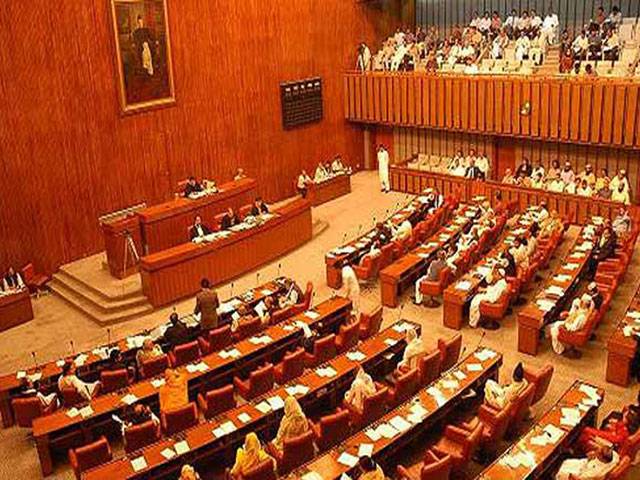ISLAMABAD - The senators, mostly from the PPP of opposition benches, yesterday demanded to repeal the law under which National Accountability Bureau (NAB) saying the anti-corruption watchdog was established by a military ruler for ‘political re-engineering and not to end corruption’.
However, the response of the government in Senate was not different from the opposition and treasury lawmakers as Law Minister Zahid Hamid said the government was ‘keen’ to replace the NAB with the National Accountability Commission (NAC) under the historical document of Charter of Democracy (CoD) signed between PPP and the PML-N.
“PM is keen that it should be done as I am under his instructions,” he said.
He said that the government had a policy of zero tolerance against corruption but fell short of impressing the opposition as the leader of the opposition Aitzaz Ahsan dismissed the assertion simply by shaking his head.
Speaking on a motion in the Senate moved by PPP Senator Saeed Ghani to discuss the over performance of NAB, both the ruling PML-N and PPP shifted responsibility on each other for not revamping the bureau and replacing it with NAC as agreed in CoD.
The lawmakers termed the NAB law a ‘black law’ saying it gives absolute powers to chairman of the bureau while the courts have been deprived of their powers of giving bail.
They also opposed the provision of plea-bargain under the law and asked for the formation of a parliamentary committee to revisit the law.
Former chairman Senate and legal expert Farooq H Naek, speaking on the motion, asked for annulment of the NAB Ordinance under which the bureau was formed by then military dictator General (r) Pervez Musharraf.
“Under the law the NAB has powers to arrest any person but courts have no powers to grant bail to any accused,” he said while strongly rejecting the law. Giving his arguments, he said that NAB law was derived from the Provisional Constitutional Order (PCO) during Musharraf era.
“You repealed PCO but did not abolish this law,” he said. He said that both the previous and incumbent governments have failed to do this and proposed that the chairman should constitute a parliamentary committee to look into NAB Ordinance.
Farhatullah Babar alleged the idea behind the establishment of bureau was ‘not to end corruption in the country but to do political re-engineering’.
“Unless the NAB holds accountable the sacred cows [a reference for army], such law will be futile,” he said. Giving an example, Babar said former military dictator did not appear before a special court and got admitted in a military run hospital but when Dr Asim Hussain, a PPP minister, demanded for a medical treatment he was denied.
Earlier, Saeed Ghani pointed out that the chair NAB enjoyed absolute powers, under NAB law, and around a dozen director generals (DGs) of the bureau were working for years in violation of the rules. He alleged that the principal accused in Rs 12 billion financial scam of National Bank of Pakistan (NBP) branch in Bangladesh, Munawar Hussain Gopang, was working for the NAB these days.
Another PPP Senator Dr Babar Awan said that a proposed bill for making amendments in the NAB law was pending with the parliament. “When both PPP and PML-N had agreed under CoD to disband NAB, why you are sitting idle,” he said and added: “The parliament should not give the impression that it wanted to cover up corruption at a time when Pakistan’s name was in the headlines because of Panama leaks.”
He demanded that those Pakistanis whose names were in the Panama Papers should be disqualified from holding official positions and those arrested who were abroad.
Law Minister Zahid Hamid assured the house that the government would reform the NAB and NAC would be established.
He gave figures relating to performance of the NAB saying, “Apparently, it has good performance as it had recovered Rs 275 billion since its inception. He referred to PPP’s term in office and said that the stance of government at that time was responsible that the draft law was not approved.
“The law was being weakened to the extent that it became unacceptable for us and we gave four dissenting notes,” he added. “Talking about the steps of his government, he said we did not oppose private members bills in the National Assembly over the subject.
Meanwhile, the house rejected a resolution of Tahir Hussain Mashhadi asking government to discontinue the facility of provision of free of cost electricity to the employees of Wapda.
The house adopted a resolution through e-voting system to extend the prime minister’s scheme for provision of opportunities of quality education to the talented students of Balochistan and Fata for another term of five years.
The debate on a motion about implications of departure of General (r) Pervez Musharraf was deferred till the presence of state minister for interior in the house in ongoing session.
Friday, April 19, 2024
Senators for repealing NAB law
| Say watchdog was established by military ruler for ‘political re-engineering and not to end corruption’ | Minister says govt keen to replace NAB with NAC

Mehwish Hayat says she would like to work with Aamir Khan
9:59 PM | April 18, 2024
'That'll be awesome,' Rohit Sharma on idea of Pakistan vs India Test series
9:17 PM | April 18, 2024
Turkiye commends Pakistan's efforts in fostering regional peace
9:03 PM | April 18, 2024
CM Maryam's security squad hits biker to death in Narowal
9:02 PM | April 18, 2024
Hafiz Naeemur Rehman sworn in as new emir of Jamaat-e-Islami
8:54 PM | April 18, 2024
Hepatitis Challenge
April 18, 2024
IMF Predictions
April 18, 2024
Wheat War
April 18, 2024
Rail Revival
April 17, 2024
Addressing Climate Change
April 17, 2024
Justice denied
April 18, 2024
AI dilemmas unveiled
April 18, 2024
Tax tangle
April 18, 2024
Workforce inequality
April 17, 2024
New partnerships
April 17, 2024
ePaper - Nawaiwaqt
Advertisement
Nawaiwaqt Group | Copyright © 2024





